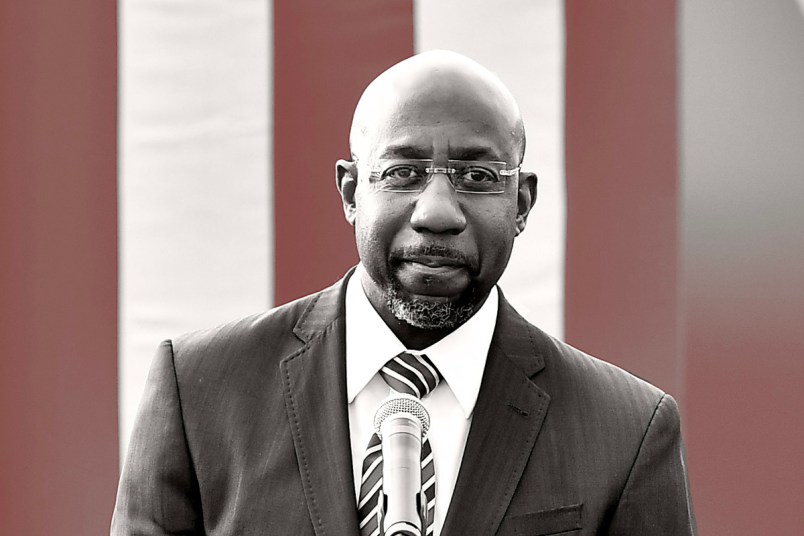Sen. Raphael Warnock (D-GA) has won reelection, and his first full term, in a runoff victory just two years after his last one.
Warnock initially won the remainder of the late Sen. Johnny Isakson’s (R-GA) term in 2020, so had to run for the next full term this year.
Warnock finished ahead of Republican Herschel Walker by about 37,000 votes last month, but fell just short of the 50 percent threshold needed to avoid a runoff. In 2021, Georgia Republicans chopped the runoff calendar in half — part of a bundle of voter restrictions they passed after Warnock and Sen. Jon Ossoff (D-GA) triumphed in the last runoff — so Warnock and Walker only had about a month to try to reinvigorate the scorched-over Georgia voters to turn out one last time.
Walker was dogged by baggage in the final stretch, much as he was all campaign long: new details of accusations of violence or coerced abortions surfaced from ex-girlfriends, and his very brief residency in the state came under scrutiny. He avoided the press and public events during the critical final days.
Donald Trump backed Walker from the beginning, seemingly hoping that the former University of Georgia running back’s football resumé would obscure the skeletons in his closet. It’s another blow in a dismal midterm cycle for the former president, who saw many of his highest-profile picks lose.
Problems with candidate quality shot through Republicans’ attempts to flip the Senate this cycle, from Walker to Mehmet Oz in Pennsylvania to Blake Masters in Arizona losing winnable seats. Sen. Rick Scott (R-FL), chair of the Republicans’ Senate campaign organization, has not so far seemed inclined towards self-reflection, instead promoting himself as a candidate for Senate minority leader instead of Mitch McConnell in the immediate aftermath of the elections.
Warnock’s win is also another happy data point for Democrats in Georgia’s evolution, as the Peach State has now produced multiple cycles in which voters opted for Democratic Senate candidates. Much of that seems to be the result of a turnout and mobilization machine that put the state into play for Democrats in a way it simply wasn’t for decades.
Democrats had already secured the effective majority in the Senate without Warnock, thanks to Vice President Kamala Harris’ tie-break. But Warnock’s win gives his party a cushy buffer.
For one, it’ll somewhat dilute the power of Sens. Joe Manchin (D-WV) and Kyrsten Sinema (D-AZ) to stymie President Joe Biden’s agenda (such that it is that can pass through a Republican House). Democrats will be able to lose one of them, and only have to negotiate with the other.
It also means that Democrats will have the majority on all Senate committees, rather than having to split membership with Republicans. That’ll grease the skids for discharging legislation, and particularly judicial nominations out of the Senate Judiciary Committee — one of the biggest areas in which a Democratic Senate will be able to make substantive progress, even having lost the House.
Democrats will be able to take votes without up to two members, providing some relief when illness or some other kind of absenteeism inevitably strikes.
Warnock’s win will also give Democrats some much-needed relief going into an utterly grisly 2024 Senate map where Sens. Jon Tester (D-MT), Sherrod Brown (D-OH), Bob Casey (D-PA), Tammy Baldwin (D-WI), Jacky Rosen (D-NV), Debbie Stabenow (D-MI), Manchin and Sinema are all up for reelection. By contrast, the only remotely competitive seat Republicans will be defending is Scott’s in Florida. Democrats will take every seat they can get now to gird against some seriously competitive terrain in two years.







YES!!! What a relief.
First! I want to thank all who said that someday it would be my turn and supported me along the way.
Yay!!!
Well done Georgia Dems, you came through for us!
Hi! To find out what I can do, say
@discobot display help.Oh, thank god–or should I more properly say, thank Georgia!